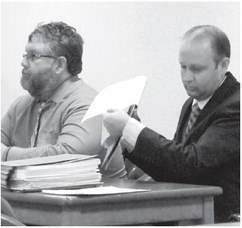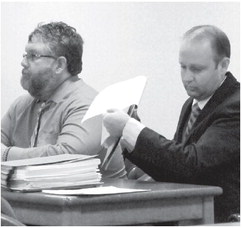Ruling clears way for jury trial for deputy Bowers


A jury trial could come as early as September for a Taylor County sheriff’s deputy charged with two felony counts of misconduct in office for the unauthorized release of case files to producers of a true-crime television program.
Steve Bowers has been on paid administrative leave from the Taylor County Sheriff’s Department since February 2017 over the unauthorized release of case files, relating to an unsolved murder investigation, to a true crime television program.
In October 2017, the State of Wisconsin filed the two felony charges against Bowers alleging he exceeded his authority in releasing the case files which included case information from the state Department of Criminal Investigations (DCI). In November 2017, the county personnel committee took administrative action against Bowers for the same incident, demoting him from detective sergeant to a patrol position and suspending him without pay for two months. Following the suspension, Bowers has been on paid leave from the sheriff’s department pending the outcome of the criminal case. Bowers currently lives in Wausau.
On Feb. 11, Bowers appeared before judge Robert Russell in the Lincoln County Courthouse for an oral ruling on a series of motions made by Bowers’ attorney Rick Cveykus during a December motion hearing. Key among these was over if Bowers had an expectation of privacy by using his private DropBox account set up using a count-issued email. Cveykus had argued that because the county did not get a search warrant to access the account it amounted to an illegal search.
DropBox is an online cloud-based storage system that people pay a monthly fee to subscribe to and use. Bowers set up and continues to pay for the account. However, the email account for the username is his county-issued email account.
The state’s attorney had countered this argument saying that the information technology use policy signed by Bowers recognized that he had no expectation of privacy when using the county equipment.
Judge Russell agreed and in his oral ruling denied the motion to suppress on an expectation of privacy, The other argument made by Cveykus was that the investigation of Bowers involved a violation of Bowers’ Garrity Rights. Garrity Rights protect public employees from being compelled to incriminate themselves during investigatory interviews conducted by their employers. This protection stems from the Fifth Amendment protection from the government compelling a person to be a witness against himself.
Judge Russell likewise ruled against Bowers in this motion finding there was no grounds to suppress the evidence of his admitting to then sheriff Bruce Daniels that he released the files.
A third issue argued at the motion hearing involved the possible use of official complaints lodged with the Wisconsin Department of Justice (DOJ) against Daniels during his tenure as sheriff.
Cyvekus argued in favor of compelling the state to release the investigation on discovery. He argued that the information in the reports could impact the credibility of Daniels as a witness in an eventual trial. In his motion, he called for the release of all complaints against Daniels.
In this motion, Judge Russell ruled that discovery should be allowed and that Bowers and his attorney should be provided redacted documentation by Wednesday, Feb. 19.
A status conference for the case was set for March 4 with the court to consider the scheduling of a three-day jury trial to occur in early September.



